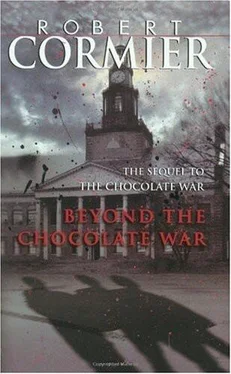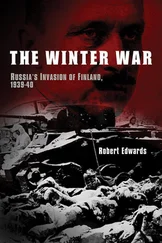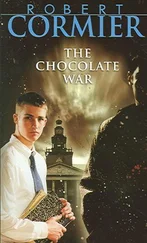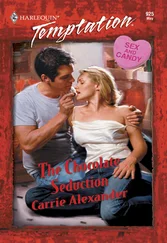"What you don't know can't hurt you," Obie said. Numb now, bones singing with the pain of exhaustion, all exhilaration gone. And thinking: What a guy knows can hurt him.
Rain. Pelting the streets and sidewalks and lashing at Obie as he walked toward Laurie's house. He had taken to keeping a vigil across the street from her house at various times of the day and evening, drawing comfort from being near the house she lived in, slept in, took showers in (the vision of her naked under the water's spray caused an ache in his groin), ate her meals in. The house was precious to him because she lived in it. Standing under a leafy tree for shelter, clothes soaked, hair matted — he had neglected to wear a hat or raincoat — stamping his feet now and then, he realized the futility of the solitary watch.
He saw her brother approaching from the far end of the street. Clutching a book bag to his chest, he kept his eyes down as he approached Obie, as if afraid he might be robbed. He always looked as if he expected the worst to happen. And only twelve years old. Wait until he gets to high school, Obie thought.
"When's Laurie coming home?" Obie asked, not wanting to ask this particular kid anything but the question emerging from his frustration, soaked and lonely here on this rotten street when he should be home trying to catch up on homework.
The kid didn't stop walking and called over his shoulder: "She's home. She's been home two days."
"Oh," Obie said stupidly, mouth hanging open, the taste of rain bitter on his tongue.
"I don't think she likes you anymore," her brother said, not viciously but with the uncluttered honesty of a twelve-year-old kid.
Obie did not reply, said nothing, stood miserable and abandoned, all the lights in the world dimmed and dying, knowing in the deep places of his being that he had lost Laurie Gundarson forever.
The heat wave came without warning. In May, for crying out loud. Out of season, too early, arriving before the body was prepared, blood too thick, skin too pale. The heat rose from the streets and sidewalks as the sun hammered at the earth without mercy, shimmering from budding trees and flowering shrubs.
The heat turned the Trinity student body into a sluggish army of sleepwalkers. The exhilaration of the seniors, aware that final days had arrived and that classes were meaningless now, was muted by the waves of heat and humidity that moved indolently across the campus. Fosters plastered to corridor walls and classroom bulletin boards announcing the coming of Fair Day, the last event of the year, were met with indifferent stares or yawns.
Archie loved the heat. He loved it because other people were so uncomfortable, sweating and groaning, stalking through the heavy air as if their shoes were made of lead.
He had many ways of avoiding the blistering temperatures. Keeping cool thoughts. Controlling his emotions. Laying low. No Vigil meetings or activities. His leadership of the Vigils was a tiling of delicate calibration, and he knew instinctively when to call meetings, to adjourn them, or to allow the Vigil members to go their way. Like now. Knowing everyone's discomfort, knowing they would resent any extra effort, any assignment.
The heat also took the pressure off current events. Although maintaining a reserved attitude, Archie had as usual been keen-eyed without seeming to be, watching, observing. Two targets of observation, Obie and Carter, seemed like twins. Both walking trancelike, preoccupied with their thoughts and worries. Which meant they would be unlikely to do anything foolish or threatening. At certain moments Archie was a bit apprehensive — what was going on inside Obie? Was he plotting revenge in a quiet way or merely accepting his fate? Carter was easier to read. The swaggering athlete had turned into a shoulders-hunched, narrow-eyed specimen these days, like a hunted creature, passing quickly by, not talking to anybody. Archie knew what was going on inside him and delighted in the knowledge. Let him stew awhile in his thoughts and fry in the heat. Time enough to take care of Carter, the traitor, in his own way. Meanwhile, Carter was torturing himself — a sweet Archie touch, letting the victim be his own torturer. All in all, Archie found a certain satisfaction in the heat wave.
The heat did not touch Caroni, either.
He had erected a screen around himself, invisible obviously, which the heat could not penetrate. Neither could anything else in this world.
His world was without seasons. And, thus, without weather. He operated beautifully in this atmosphere, his mind clear and sharp, a thing apart from his body. He marveled at the way he responded to the necessities of life, performing his silly but necessary duties as a student, son, brother. He could perform so well because he knew that he would not have to do so forever. He knew there was a moment when the command would be given, and events would be set in motion.
David was drawn incessantly to the parlor and the piano. The parlor was cool, windows closed, curtains drawn, isolated from the rest of the world. David raised the piano lid, sounding middle C. Waiting. For an echo? He didn't know.
He was a bit afraid of the piano, the keys grinning at him in the shadowed room. As he was staring at the keys one afternoon, a thought occurred to him. Transmitted somehow from the piano to himself. The thought was actually an image. A knife. The butcher knife his father used on occasion for big roasts and turkeys. He checked to see if the butcher knife was in the special drawer with the other kitchen utensils. He touched the knife, ran his finger across the blade, and announced: "Yes, I found it." He did not know whom he had said his words to. But knew that someone, something, had heard him. And that he was drawing closer to the time of the command.
Thus, in the heat, David Caroni waited. For the signal. Knew it must come soon. He didn't mind waiting, he didn't mind the heat. Every day he went into the cool parlor and stood near the piano, waiting.
The heat always made Emile Janza horny. Actually he was almost always horny, but the heat intensified his feelings. Girls dressed flimsily" in the heat, of course, wearing sleeveless, see-through blouses, brief skirts, or short shorts that exposed their bodies beautifully.
Other things made him horny as well, something he noticed increasingly as time went on. He noticed it first in football during plays in which he tackled his opponents bruisingly and without mercy. A distinct wave of sexual pleasure swept him on these occasions. Sometimes when he engaged in a scuffle in the parking lot — Trinity was a very physical place — he would be instantly aroused. He had felt that kind of swift pleasure last fall when he had faced the Renault kid in the boxing ring, and even earlier when he had beat him up in the woods behind the school. Those were beautiful moments, really.
The beauty had returned the other day when he spotted Renault in the park. Sitting on the lawn with his creepy friend whose name Emile did not know. Spotting Renault, recognizing him even from that distance, he was surprised to find he had returned to Monument. Janza had heard the kid had run off to Canada, afraid he might get beat up again. And now he was back. Asking for more trouble. Janza was tempted to tell Archie Costello about Renault's return. Then decided against it. He wanted to keep Renault for himself.
Now, in the heat, in his house, nobody home, Janza picked up the telephone book. Looked up the R 's, Felt nice and sexy.
Flipping the pages, he found Rathburn. . Raucher. . Red Cross Hdqtrs. . Reed, and, finally, Renault. Two Renaults in the book. Easy to check out.
Renault, that little jerk. He should not have come back to Monument. He should have stayed in Canada.
Читать дальше











